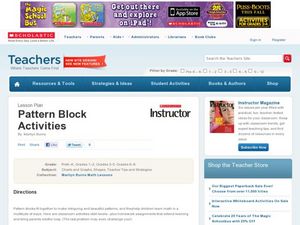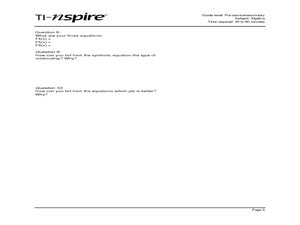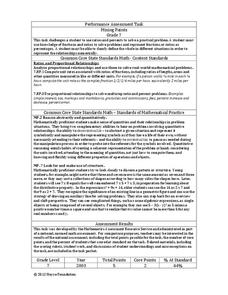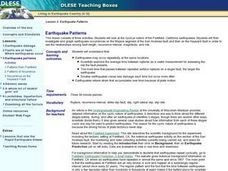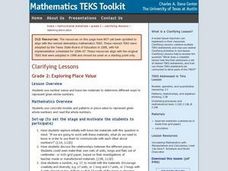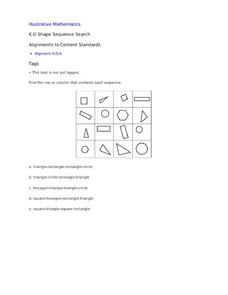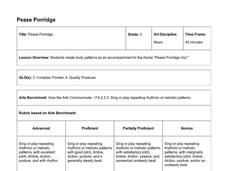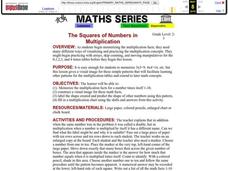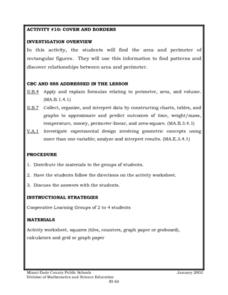Curated OER
Math: It's About Patterns
Fourth graders discover place value patterns through various games and readings and record their findings in journals. In pairs, they use manipulatives such as place value tents and digit cards to drill and practice writing numbers in...
Curated OER
Pattern Block Activities
Pupils practice various math skills by using manipulative activities. In this math manipulative lesson, students sort shapes, build hexagons, and build shapes using manipulatives. These activities would be great for parent ed or homework.
Curated OER
Classroom Idea: Clap Along
Students study patterns. In this math lesson, students repeat a pattern that has been clapped out by the teacher. Actions can be added to increase difficulty level.
Curated OER
In and Out Function Problems
Third graders solve In and Out function problems. They analyze a chart and discuss the steps to solving the functions, and discuss the patterns and complete the charts. Students then create a book of repeating patterns using magazines,...
Curated OER
Adding Tens
Second graders explore and discuss adding 10 as they predict number patterns with the hundred chart. They work in pairs, groups choose a number, 1-9, and predict what happens if they add 10 to the number. Students make-a-ten strategy...
Curated OER
TI-Nspire Activity: What Does Your Representation Tell You?
By learning to select the best representation for three meal plans, students compare three meal plans to determine the best choice. Data for the meal plans is sorted on a table, as an algebraic equation, and graphed on a coordinate grid....
Curated OER
Continuing Patterns
In this pattern worksheet, students continue a pattern, completing rows, 5 rows total. Rows are pattern shapes. A reference web site is given for additional activities.
Inside Mathematics
Squares and Circles
It's all about lines when going around. Pupils graph the relationship between the length of a side of a square and its perimeter. Class members explain the origin in context of the side length and perimeter. They compare the graph to the...
Curated OER
Red Circle, Red Circle, What Do You See?
Young learners explore shapes and colors. They listen to Brown Bear, Brown Bear What Do You See? by Bill Martin Jr. and use the same language pattern to create a color and shape book of their own. After that, with the leftover magazine...
Noyce Foundation
Mixing Paints
Let's paint the town equal parts yellow and violet, or simply brown. Pupils calculate the amount of blue and red paint needed to make six quarts of brown paint. Individuals then explain how they determined the percentage of the brown...
Alabama Learning Exchange
Unit Circle: Special Angles—Just Know One
It's all about the patterns! Young scholars learn that the unit circle repeats itself in all four quadrants. Using these patterns, they evaluate the sine, cosine, and tangent of special angles.
Curated OER
Number Patterns and Sequences
In this number patterns and sequences worksheets, students complete activities for number patterns and sequences including Fibonacci's Sequence, lines, regular polygons, and towers. Students complete 15 problems.
Curated OER
Comprehension of Word Problems
Students demonstrate how to solve multiplication word problems. In this problem solving lesson, students read examples of multiplication word problems and are taught how to use repeated addition to solve the problems. This strategy is...
Curated OER
Earthquake Patterns
Students identify and interpret the cyclical nature of the Parkfield, California earthquakes. They then investigate and graph earthquake occurrences on the Mojave segment of the San Andreas fault and then on the Hayward fault in order to...
Curated OER
Applied Science - Science and Math Lab
Students examine fabric. In this Applied Science lesson plan, students look at the fibers of fabric through a microscope. Students compare and contrast a variety of fibers.
Curated OER
Grade 2: Exploring Place Value
Creative problem solving is fun and helps kids conceptualize content. They use grid paper, manilla paper, and markers to cut, draw, and show given double-digit numbers as many ways as they can.
Illustrative Mathematics
Shape Sequence Search
Learning that size and orientation don't affect the classification of shapes is a big step for young mathematicians. Support children with developing this key understanding by looking at the array of shapes included in this resource. For...
Hawaiʻi State Department of Education
Pease Porridge
Practice using different ways to express a single pattern. The class uses concrete, pictorial, and numerical modes to represent patterns found in a simple rhyme. They will move their bodies, use body percussion, draw, and use numbers to...
Curated OER
Try Tessellation
Most middle schoolers probably feel that quilting is at best an activity left to their grandmothers. This lesson uses the Zome modeling system to get them to realize how shapes in quilting are really tessellations and repeating patterns....
Curated OER
Fabulous Fractals
Students view a video to discover how patterns in nature relate to math. They explore the concept of exponential growth by observing and creating fractals. They solve and design word problems.
Curated OER
The Squares of Numbers in Multiplication
Review multiplication facts and concepts! This clear, and easy to follow lesson will help your class to understand multiplication by using arrays and repeated addition. There are strategies to help with memorization and manipulative...
Curated OER
Counting to 100: Step-by-Step
Introduce your pupils to the hundreds chart! This pair of worksheets is designed to walk them through the patterns they see in the chart as they count by ones and 10s. They fill in missing numbers on a hundreds chart, using guided steps....
Curated OER
Investigation - What's the Number?: Division
Seventh graders explore number sentences using a variety of strategies making each equation a true sentence. Students examine strategies such as patterns, trial and error, working backwards, and related problems. In groups, 7th graders...
Curated OER
Cover and Boarders
Students find the area and perimeter of rectangular figures. They use this information to find patterns and discover relationships between area and perimeter. Students apply and explain formulas relating to perimeter, area, and volume.



